#⋆ *ੈ✩﹕ ◜ portrayal notes. ◞
Explore tagged Tumblr posts
Text

MARIGOLD - PORTRAYAL MASTER POST
Tags: Headcanons. Asks. Interactions.
This post is to cover all major information as well as any important details that are worth sharing about the original character of Marigold Hoshizora. All of these points remain no matter the verse unless stated otherwise or plotted with specific partners. Listen. I love Aquarius and Lucy and their dynamic, but also consider, someone else entirely separate from Lucy and Fairy Tail as a whole finding her key? Walk with me here. Important Note: Marigold is obviously very linked to my Aquarius portrayal, and the two will commonly appear in threads together
1 ) Basic Information and coming to find Aquarius Key out of the way first: Marigold 'Mari' Hoshizora was born in the small southern beach town of Mosaic to two non-mage parents. One day, at the age of 8, Mari was playing on the beach when she felt something calling to her. After wandering along the coast for a few minutes, she finds a golden key partially buried in the sand only a few feet into the ocean. Upon digging it up, she realizes that is what has been calling to her and began messing around with it before putting it back into the ocean and turning it, awakening her magic power and summoning Aquarius all in one go.
2 ) Following her contract with Aquarius and awakening of her magic, Mari's parents would often take her on frequent trips to any close by mage guild in hopes of finding another Celestial Spirit mage who could help Mari or give them any information on where to get her more keys. Because of this, Mari is very friendly and trusting toward guild mages, and will tend to ask them hundreds of questions about their magic, just in the desire to learn more about magic.
3 ) Mari has 4 keys. 3 silver keys and 1 Gold Key (Aquarius). Her three silver keys is a key for Lepus: a spirit that works in a similar to Nikola, but are more rabbit like in appearances and are typically meant only as pets, Scutum: a spirit meant for defense and protection and manifests as a knight covered head to toe in a heavy army that can summon shields, and Delphinus: another water summon based spirits that allows for quick transportation and very basic combat.
4 ) In her main verse, Marigold is very much still a child, only sitting at 9 years old. Maybe later down the line I'll give her a verse where she's an adult and has more come into her own as a celestial spirit mage, but for now, she is just a small child with no guild affiliation learning the ways of magic.
5 ) Aquarius is her best friend. The town she comes from is small and there aren't many mages in said town, so the revelation of her magic sort of isolated her from most other kids in the town, meaning she only really does learn to rely on Aquarius for company, spending a lot of her time at the Beach summoning the spirit and just talking with her and asking her questions about the celestial spirit world and all the other people she has met in her long lifetime. She loves hearing stories of Aquarius previous journeys, the other spirits and her previous owners.
More shall be added / this post shall be updated when deemed necessary
3 notes
·
View notes
Text
We all know that haikyuu is packed with life lessons, especially about growth and competition but one of the things that brought me so much comfort in life is the story of Miya twins. Both Osamu and Atsumu were hard workers but what differentiated them when it comes to volleyball prowess was their priorities. Osamu being a naturally gifted athlete was a major push in Atsumu's life; they made each other better (and worse in some ways). But it was Atsumu's choice to become a professional player and a great setter that pulled him ahead. Atsumu was dedicated to it and if Osamu wanted he could've reached the same skill level (or maybe even more).
Basically as long as you love and want something enough, despite there being "better" people out there, you'll reach greatness in your own right. And I think it's beautiful that consistent effort, even if it takes longer than "natural talent" (which is a topic for another day), will get you where you want to be.
Also, you can be good at something and even have potential to be greater and yet not choose it. You don't HAVE TO pursue anything just because it's expected or even possibly the most natural course for you to take. What matters is what you love.
#haikyuu!!#miya atsumu#miya osamu#miya twins#atsumu#osamu#hq#haikyuu#will I ever stop gushing about hq? No.#also as a side note#osamu choosing cooking (a traditionally feminine role: not considering the sexism in culinary industry#the media portrayal that promotes men as chefs and other reasons#etc) over sports (a traditionally masculine role#but let's be honest women are great at it)#is also amazing#men who cook>>>>>#endless gratitude to#haruichi furudate#orange pops
167 notes
·
View notes
Text









Is school your most important thing? Resigning from school is not enough. You need to give up on a more important thing. Do you think what I’m giving up is school? Then what is it? Do you really not know? The most important thing that I’m giving up. It’s not school. It’s you, Shin. I’m giving up on the chance to be with you.
HIGHSCHOOL FRENEMY | EP.07
#high school frenemy the series#high school frenemy#hsf#highschoolfrenemyedit#hsfedit#*gifs#april.gif#saint x shin#skynani#sky wongravee#nani hirunkit#not immune to those sad puppy eyes#on a serious note: i really really really enjoy this show i think it's catching up fast with peaceful property as my current most favorite.#i haven't watched the kdrama version so i'm not sure how this will end. but one thing i LOVE skynani portrayal of saintshin.#the intense emotion between them is *sending stars*
114 notes
·
View notes
Text
Sonic 3 spoilers!!! Talking about the mid credits scene/what people have been saying about it under the cut
feeling like the only one who doesnt want reverse sonamy for the movies </3
or more accurately, fine sonic can have an obvious crush on her but i dont want ‘reverse sonamy’ to mean ‘amy doesnt have a crush on sonic.’ she can be lowkey about it or whatever (like sonic is sometimes in the games/other media) but to me part of Who She Is is that shes this super cool, super strong, intelligent fighter but shes also still a young girl who has crushes and believes in fate and is guided by her compassion, not by her strength or her mission or her love of adventure.
shes such a good character because while she is physically strong and possibly slightly magic, those are equally as important as her love and compassion and care for the world and people around her. preserving amys girlhood is important to me like loving sonic isnt her single defining character trait bc she ‘has to have a crush on a guy’ but it is a main character trait because thats just who she is. a loving person who sees the good in the world and wants to protect it and loves sonic because she sees him as the embodiment of that
#SPOILERS in the tags as well#sonic movies#sonic movie 3 spoilers#sonic movie 3#sonamy isnt even like my favorite ship or anything but#greatest fear is that they girlboss movie amy too close to the sun#like sonic boom is too girlboss (which is fine in the context of boom bc its not mainlike and i love boom)#i think frontiers and idw (…what i’ve read at least) do a good job balancing it. and like even look at amy in sa1#or sa2. they arent perfect but they show that one of amys ‘powers’ is simply her compaddion and love#and really what this boils down to is that. amy being ‘girly’ isnt bad. yknow its all the rage to make one note woman characters who are#badass and sarcastic and guarded and nothing else bc See! This Woman Isnt Girly Therefore Shes A Progressive Characterization#but like the problem with overly girly chars in the first place was acting like girls are unintelligent/dumbed down by crushes/only purpose#in life is to swoon over men/be rescued#they went from one note damsel in distress to one note damsel causing distress#but amys crush isnt something that needs to be ‘fixed’ about her characterization#bc an actual nuanced portrayal means her being cool and awesome and also still being girly and embracing that#do you seen what im saying do you see the vision i just love her a lot#donnie speaks#sonic movie spoilers#sonic movie#sonic 3 spoilers#sonamy#sonic spoilers
49 notes
·
View notes
Text
I don’t think ppl give enough credit to rui for his dedication to fucking with people (outside of tsukasa of course) like. Knowing & acknowledging that nene wants nothing to do with him and Tsukasa on her first day of second year and deliberately following tsukasa to loudly ask if she’s getting along with people (just to be a jackass)? Implying his gift to akito will explode even though it won’t bc he wants to bug akito? Like I think rui at his core is full of love and a desire to make ppl smile but I also think he’s 200% committed to the bit first and foremost. If something will be funny he’s going to do it regardless of the consequences. Guy filled with zero social anxiety & a never ending desire to embarrass his friends.
#‘he’s insecure’ is very fanon. like I think he has hang ups over that obviously as one does when one is excluded from their peers for being#odd. but he’s never had that issue w the general public. w friends? a little. but he’s kinda moved past that#gestures towards the Halloween wxs story and (heavy sigh) rmd.#project sekai#in general I will die on the hill of rui and Tsukasa having so much more self assurance and confidence than ppl give them credit for#if u want a fail girl nene is right there. open ur eyes.#consequences of ppl only viewing him thru a shipping lense…#*nene* is socially anxious#rui canonically trespassed on ppls property to put on solo shows for several years.#i could go on a rant abt tsukasa & the portrayal of him w social anxiety despite the ample evidence against it but I don’t feel like doing#it in the tags bc it is entirely unrelated. rui and Tsukasa (handshake emoji) horrifically misrepresented by fanon.#2 end on a more positive note: everyone think abt the comic where rui is perfectly capable of understanding emu#and he has the ‘all perfect’ text after comprehending her fascinating vocabulary. beautiful. perfect wxs relationship moment.#read curtain call again. & the other rui focuses. main story in general. etc.
144 notes
·
View notes
Text
Mysterious Lotus Casebook and Complex PTSD Representations: Part I
One of my favorite things about Mysterious Lotus Casebook is how surprisingly nuanced and unusual its portrayal of complex PTSD is. So many shows either introduce character trauma to make the character Sad and Brooding, Angry and Violent (if they’re a villain) or Hesitant to Start a Relationship (if it’s a romance), and that’s usually as in-depth as it gets. If they address the unique after effects of child abuse that lead to complex PTSD at all, it’s usually either explain why a character is a homicidal monster (which is all sorts of problematic) or it’s limited to a single phobia, which can be overcome by the Power of Love, or it’s just something that crops up occasionally for Plot and then forgotten about the rest of the time.
Mysterious Lotus Casebook gives us two deeply traumatized characters–Li Lianhua and Di Feisheng–who each have clear symptoms of complex PTSD, and yet, their cPTSD manifests completely differently because of the types of traumas that caused it and their relationships to the people causing the traumas. And their manifestations of cPTSD affect just about every level of their being, including their sense of self, their decision-making, and their relationships with others, and it includes some of the incredibly important manifestations of cPTSD that are almost never shown in media while avoiding the most insulting stereotypes!
PTSD vs cPTSD
Post Traumatic Stress Disorder is an anxiety disorder caused by experiencing a single (or short lived) traumatic event (an accident, assault, medical emergency, fighting in a war, etc), where the symptoms last for longer than a month. Symptoms include things like reexperiencing the event (flashbacks), avoidance (of things related to the event), changes in mood (depression, anger, fear, etc), and issues with emotional regulation (hypervigilance–being constantly on the lookout for threats–irritability/angry outbursts, etc.).
Complex PTSD happens if someone has experienced long term, chronic/repeated trauma that induces hopelessness and no chance of escape (survivors of extended child abuse, human trafficking, domestic violence, prisoners of war, slavery, etc.). It’s also often interpersonal in ways a car crash or medical emergency is not, and is particularly linked with chronic trauma during childhood: chronic stress hormones introduce literal physical changes in a growing brain, particularly the amygdala (which processes fear), hippocampus (which is responsible for learning/memory), and the prefrontal cortex (which is responsible for executive function), so it can affect every aspect of life and also affect a child’s progression through developmental stages. In addition to these physical changes to the brain, the prolonged trauma–particularly the helplessness–distorts a child’s sense of self, the perpetrator, and the world in ways that alter their decision making, their memory, and their future relationships.
For instance, whereas a traumatic event that caused PTSD might make you depressed or not trust the person who harmed you (or to fear driving), the trauma from cPTSD might make you suicidal, blame yourself for your victimization, decide to isolate to avoid interpersonal relationships to keep from getting hurt, or become obsessed with never being harmed again.
Basically, cPTSD has the core symptoms from PTSD with some extra challenges, including issues with emotional regulation, self-concept, interruptions in consciousness, difficulties with relationships, perceptions of the perpetrator, and systems of meaning.
DFS and LLH: CPTSD Symptoms
There’s so much more to say about this than I can cover in this superficial introduction, so this will be the first of a series of metas; I’m hoping to go into more depth about some of these categories in future posts (the DFS and emotional regulation/violence one is already drafted, so stay tuned).
Difficulties with Relationships (problems with trust, communication, missing red flags): Both DFS and LLH have a history of trusting the wrong people and not trusting the right people, both in the past and in the present of the show: in the past, LLH missed the fact that SGD hated him and DFS missed the fact that JLQ was obsessed with him, and as a result, both sects were destroyed, many people died, and the two almost destroyed each other. If they had communicated with each other instead of fighting at the donghai battle, they might have realized they were being set up and could have worked together, but their difficulties with trust after perceived betrayal made that impossible for them. They both have a history of overlooking red flags in the present–DFS in particular, keeping the red-flag-personified-JLQ around despite her history of poisoning people, including himself–and they both tend to struggle with relationships in the present: LLH runs away from and/or drugs the people who care about him, and DFS sends endless mixed messages by not telling Li Lianhua most of his plans to help him.
Self-Concept (Self-hatred and self-fragmentation): Li Lianhua is basically the poster child for having a negative self concept: he has an overdeveloped sense of self-blame and responsibility, even believing he deserves to die for leading his men to their deaths, and once he learns he was manipulated and SGD was behind it all, he seems to think it’s his own fault that he was manipulated, lied to, and abused. His self-loathing is so extreme that he imagines his earlier self, Li Xiangyi, to have died, and tries as much as possible to be nothing like that earlier persona. His repeated insistence that Li Xiangyi and Li Lianhua are NOT the same person is reminiscent of the fragmentary sense of self that comes with more extreme trauma, like Dissociative Identity Disorder (DID) or Other-Specified Dissociative Disorder (OSDD), where traumatic experiences are so painful that people form different alters, or differentiated self-states, that can have different names and skills and memories and identities.
Di Feisheng doesn’t have the self-hatred or guilt that LLH does, and it seems like he tries to skip over questions of self worth, blame, or hatred by focusing exclusively on staying true to his code of ethics he’s developed for himself and focusing on gaining the strength necessary to fight for his freedom from mind control and the Di Fortress. But even though he’s kept his Di name, kept his goals the same since escaping Di Fortress, and hasn’t tried to separate himself from his trauma the way LLH did with LXY, he’s even more willing than LLH to take on different identities: it’s literally one of his martial arts skills. The Bone Constriction Skill lets him become someone else for a time, whether that’s a child or Shi Hun. It fits well with his willingness to be whoever he needs to be to accomplish his goals: he’s perfectly willing to be seen as a heartless villain if it lets him protect LLH, and he’s willing to flirt with and pretend to be jealous of JLQ to get information from her, and he’s willing to be LLH’s a-Fei, both with and without his memories.
Interruptions in Consciousness (Amnesia and nightmares for Everyone): LLH and DFS both have nightmares and flashbacks/memories of traumatic events, and as mentioned above, both have interesting hints of having fragmented/fluid senses of self. They both also dissociate, or separate themselves from the present when dealing with traumatic things: LLH spaces out and gets stuck in his past memories about SGD when talking to FDB after burying SGD, and DFS dissociates from physical pain so as not to make noise both after he’s been stabbed and poisoned with Wuxin Huai and again when JLQ is torturing him in her water dungeon.
They both also have dissociative amnesia that takes away trauma memories, although one is from a poisonous incense plus the magic of qi macgyvering: LLH forgot the existence of his older brother who died in front of him, and DFS as a-Fei had just about all of his memories (except a few of killing as a child) taken away. Amnesia is a huge part of cPTSD, because it’s the brain’s way of trying to protect you from truths that you might not survive. It can manifest as blocking out one single traumatic event, a bunch of thematically or temporally linked traumatic events, a skill set related to the trauma, or, in the case of something like DID or OSDD, just about everything. It’s endlessly fascinating to me that the show gives us one example of definite traumatic amnesia through LLH, and then seems to almost transform the experience of having DID and being a new part and finding yourself with a new name and very little else into an exaggerated fantasy setting (interestingly, people often report experiencing debilitating headaches when they try to regain memories behind the amnesia barrier). I doubt this is what they were actually going for, since DID is almost universally portrayed incorrectly and offensively in media (one of the alters is almost always portrayed as a serial killer, but that’s a rant for another day), but the different names and the presence of amnesia with LLH made it a fascinating enough parallel that I had to mention it.
Problems with Emotional Regulation (Lashing in vs. lashing out): Li Xiangyi and Di Feisheng are polar opposites when it comes to struggles with emotional regulation: whereas LXY turns his anger inward, directing it all toward self-hate in what’s often called a “toxic shame spiral,” both after the donghai battle and after he finds out about SGD’s role in his shifu’s death, DFS lashes out physically at those who have harmed him, usually via choking people, although he is usually exerting an impressive amount of control over his emotions and strength. To put in perspective just how different their emotional strategies are and how much effort DFS puts into emotional regulation, compare how much more calm he is than LLH during any revelation of past betrayal or painful information, any scene where they confront the people who have abused them, or any scene where they learn they’ve been wrong about something big; LLH is most likely having an emotional flashback (re-experiencing the emotions from the earlier traumas) and DFS is probably compartmentalizing them or dissociating from them to process later/never so he can stay semi-functional and not show a potential opponent a weak spot.
NOTE: This means that DFS is loooong overdue for a very dramatic breakdown when it eventually all catches up to him and he can’t distract himself from it anymore.
Perceptions of Perpetrators: In this way only, Di Feisheng has one advantage: he knows the head of Di Fortress is a cruel, abusive tyrant. While he clearly still fears him, even as a physically strong adult (he has nightmares, flashbacks, and dedicates his life to being free from him, which means he still to some extent feels young, small, and helpless when he thinks of him), DFS knows that he hates him and wants to be free of him. This is probably part of why he’s spared some of the self-hatred LLH experiences: he knows he didn’t deserve the abuse because seeing it happen to other children means he knows the abuse wasn’t a personal reflection on him. It does, however, motivate him to want to be stronger and invulnerable so as to never be helpless again, and that obsession is what drives him to have a single-minded focus on reaching the pinnacle of the jianghu.
It’s so much more complicated for Li Lianhua (and for a more detailed analysis, check out this meta): the childhood perpetrators were manifold–a slew of bandits, whichever children and adults on the street would abuse him for existing and being poor–it probably felt like life itself was to blame. It’s no wonder that when his shifu and shiniang took him in, they were the ultimate rescuers whom he hero-worshipped, so when he felt he made a mistake and his life fell apart, he blamed himself: at least there would be someone to blame that way and something he could do about it (try to kill his past self and hate everything about him). It’s also very telling that LLH doesn’t blame JLQ or YBQ all that much when he learns they poisoned him, and that he’s more angry that SGD murdered their shifu than he is that SGD set him up, hated him, and was the real mastermind behind everything he had blamed himself for; he struggles to stay angry at people who harm him, and would rather blame and hate himself for being tricked than hate the person who tricked him. So, whereas DFS tries to destroy the people who abused him, LLH tries to destroy himself.
If you read this far, thanks! I’m probably going to be posting the DFS and emotional regulation/violence against perpetrator meta next, because it’s drafted, but if there are any of these you desperately want me to talk about more sooner rather than later, let me know! :D
#mysterious lotus casebook#mlc meta#di feisheng#li lianhua#Li Xiangyi#complex PTSD#child abuse#sorry it's so long! This is the short version#The original version was 2700 words#dissociation#trauma#I am so here for non-monolithic representations of mental illnesses#PTSD#In case you can't tell I am very invested in depictions of PTSD and cPTSD#I'm always up for talking about fictional portrayals of trauma#so feel free to message if you have questions about any of this and don't want it to be in the notes for some reason
154 notes
·
View notes
Text

Was browsing through the wiki to get some reference and I've always found it interesting that Portrayals gave off the hint that Vertin captures their form's essence (through film most likely) and the descriptions of them are insight of the character from Vertin's perspective.
If we go by that logic...Schneider's Portrayal description ruins me.
#reverse 1999#verneider#vertin x schneider#i'm in constant shambles for these two#back when schneider was playable all vertin wants is to take her back to the orange orchard#her portrayal is the only one that refers to 'you' as if making a note to remind yourself#her profile is also the only one that doesn't inherently have it describe something about her personality or hobbies#it's a genuine opinion from the person writing the description like it's absolutely important that's what it should be written there
332 notes
·
View notes
Text

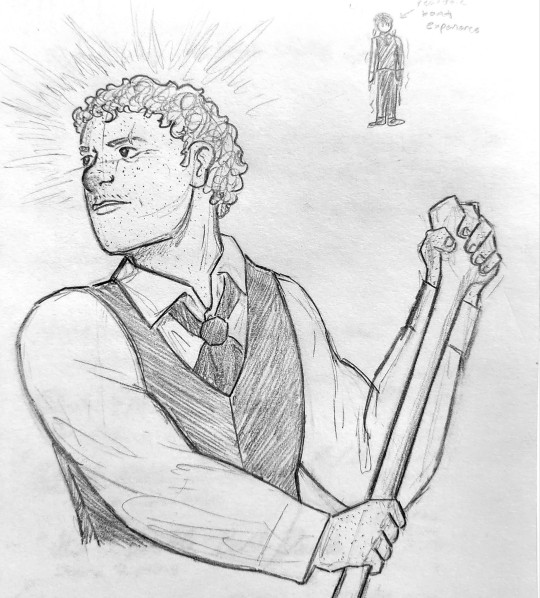


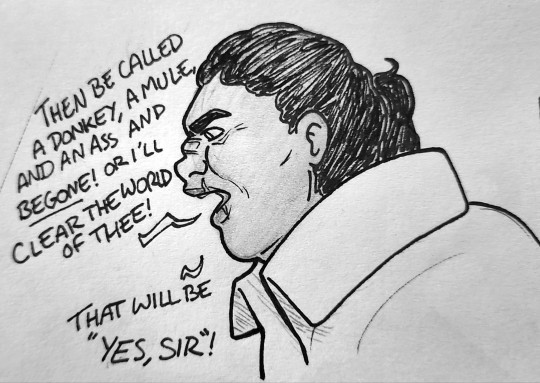
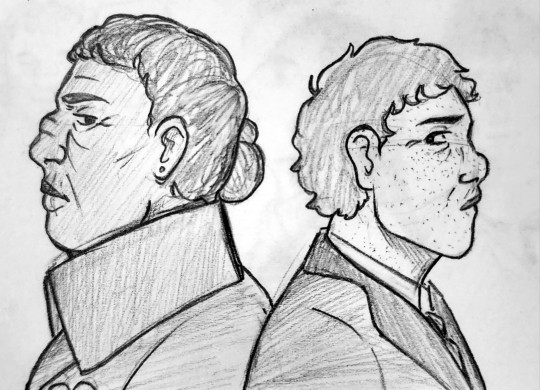



[Several drawings of Ahab, Starbuck, and Fedallah from Moby Dick reimagined as women. More detailed ID in ALT.]
hi everyone today i bring you. more women :)
a continuation of this last post, Ahab openly presents as a woman aboard her ship because she has enough job security at this point to do whatever she wants and her gender identity is essentially "call me sir, but beyond that who cares". Starbuck is still bigender as usual, so she initially went "undercover" as a man to get into the industry and then stuck with the disguise long term because she likes the way it feels to be Nathaniel. Meanwhile Fedallah is free balling tbh, she's under Ahab's protection on the Pequod and everyone's an asshole to her anyways so she truly could not give less of a fuck. All three use she/her, except for when Starbuck is undercover.
also *said through tears* ahab and fedallah are FRIENDS btw. they LOVE each other and she's FINE. melville when i GET you
also, side note because I don't think I ever mentioned it, but Starbuck is ID'd as "middle aged" in my art because (s)he is based on @pocketsizedquasar 's adaptation, where Starbuck's age has been interpreted to be around 40. <3 aging :)
anyways GIRLS! I've heard of them 👀
#moby dick#butch au#mobydick#starhab#captain ahab#ahab#starbuck#fedallah#ahab moby dick#ahab mobydick#starbuck moby dick#starbuck mobydick#fedallah mobydick#fedallah moby dick#classic lit#accessible art#described#id in alt#genderbend#genderbent#mossy art#fedallahab#throwing this in the fedallahab tag bc god can't stop me#side note my gayness over fedallah was reignited by the kill the whale album but this is not meant to be within that canon#as much as i fucking loveeee that portrayal of fedallah - she is absolutely being taken advantage of by ahab#and this one is not! her and ahab are friends and their relationship is very mutual. love and light#mobydick genderbend#moby dick genderbend
54 notes
·
View notes
Text
I mentioned this earlier but Nathaniel x Anora is one of my Beloved Dragon Age Rare-pairs. I have a fic for it even.
When I first started writing for Inara, of course, she and Alistair stayed together and Anora took the throne alone (as it should be). Nathaniel then, through a visit to the capital with Inara, reconnected with Anora, and the two began a years-long affair. I never had them marry because, well, Nathaniel is a Howe and a Grey Warden.
However, if I extended that timeline out to now, knowing what we all know, I think that after the Mess in the South (the extent of which I mostly choose to ignore tbh, that's silly), they could probably get married after the defeat of Elgar'nan. The country would be shattered, and I'm sure Nathaniel would make himself a hero.
(Inara would still be alive in that timeline as well, if she didn't die in the turmoil in the VG timeline).
But by then, Nathaniel would have redeemed himself, saving Fergus Cousland's life after Awakening and earning Delilah an estate of her own. Then, after the Combo Blight, I think everyone could move on and some of the Grey Wardens would be granted leave from the Order. Nathaniel could marry Anora and be King.
I think the two of them would vibe really well. Nathaniel is straight-laced, ruler-minded, but respectful. I think he would be more than happy to let Anora take the lead, and he wouldn't overshadow her in name. Forgiving Rendon's crimes, he carries noble blood from the Rebellion that's just a shade less powerful in line to the throne than the Couslands.
And he fucking loves a woman with a fire in her. The woman he romances at the Tourney and Velanna prove that pretty well. Plus, Rendon and Loghain were pals, and so they probably at least vaguely knew of each other or had some kind of report at some point. He clearly didn't care much for Cailan.
And Anora... Anora deserves an adult with a sharp mind and a strong capacity for actually doing his job and doing it with honor. Nathaniel has the blood, the brain, and the heart to make him an asset. And he's a good man, and would treat her like she deserves for once.
14 notes
·
View notes
Text
Throughout the Trainee, I’ve been waiting for the shoe to drop—for some big reveal about an ultimate problem at the company or for someone to be fired who had gone too far—but the show is too mature, it has to much compassion towards all of its characters (and towards people’s humanity in general) to do that.
I saw so many instances of mistakes happening, some more obvious, some subtle, some key to the plot, some seemingly background fodder, some addressed by the characters explicitly, and some that the characters or the show just seemed to observe without commenting on. Some of these mistakes didn’t amount to anything, like the broken hard drive, and some of them caused real physical harm to people in the show, like the cosmetic mix-up during testing. I presumed there was a kind of accumulation happening. I thought that the mistakes were adding up to something, a bigger conclusion about this work environment, or a commentary on work environments and society at large. The Trainee, however, refuses to construct a larger theory about work and life’s problems. It refuses to condemn anyone or any one thing to that extent. Each mistake is its own problem. And each person is capable of contributing to it and finding a way to move past it.
You see, what Jane says here is the core theme of the show:

(GIF by @ryansjane )
Don’t assume; ask questions; talk it out with the recognition that everyone is coming to the table with different backgrounds, skills, areas of knowledge, flaws, fears, and hopes. They will not be perfect, and neither do you have to be. The Trainee wants its characters and its audience to find the courage, like Ryan and Jane, Ba Mhee and Tae, or the lovely moments between Pah and all his coworkers this week, to speak up with curiosity and openness.
Then, the next step it shows so wonderfully is how you can appreciate what complexities you contributed to the situation. You can acknowledge and apologize for your role once you understand it—not because you are wrong or right, but because acknowledgement and sorries are ways to show other people that you didn’t find a way to help avoid the problem either that time. It’s important to note, as I see some discourse rising up about who apologizes in the conversations during the show, that Thai and Broader Asian cultures in general have a VERY different culture around apologies, humility, and shame so that those feelings and their related gestures are used to build connection and positive feelings, compared to negative shame in Western culture; book rec if your interested in that topic and more—Between Us: How Cultures Create Emotions.
The show doesn’t have some moral argument to say about a systemic HR issue at this office. It also doesn’t depict its office as devoid of deeply troubling systemic issues like sexual harassment. Its recommendation to address the issues, though, is not through stricter enforcement of rules or the perfecting of one’s behavior. It’s to communicate when the time is right on with self-respect and compassion.
There is just so much love and care in every element of the Trainee, and I already know it’s gonna be a comfort show to return to again and again in the future because it’s intricately produced tone and its story just release the tangled knots of perfectionism in me without discouraging me from my desire to grow and improve. You can just tell it’s done by people who love their jobs and their work environment. How rare to see a workplace in media be simultaneously so realistic in its depiction and still so positive about the overall experience 🌻

#the trainee#the trainee the series#gmmtv#offgun#janeryan#side note because I don’t talk about pi and view’s portrayal of her enough in these posts#but I love her so much and her storyline was adorable in this episode#so much like my sister who is so kind-hearted but lives for her work and really isn’t tryna dive into other things#and just a good example of an ace character#like the way she’s passionate for her work and is so supportive of her coworkers romance stuff without ever doing comparison#that’s all straight-up ace culture (it could be work or some other interest but they’ve got a field they’re into lol)
24 notes
·
View notes
Text
Okay but like being into greek mythology growing up and seeing everyone portrayed as thin, white and muscular nonstop vs now getting back into it and seeing how beautiful and diverse the art is now is an absolutely incredible feeling and it’s a wonderful thing to see
#note that I was never into pj as a kid so I never saw that side of it#who knows maybe they were doing great back then idk#but I’d read countless books and watch endless videos and the artists’ portrayals were the same#but now seeing all the art for different mythological characters who are poc or fat or disabled or anything else#it’s just so wonderful#keep it up guys#don’t let the cishetallo old men gatekeep classicism lmao#greek mythology
20 notes
·
View notes
Text

ZEREF DRAGNEEL - PORTRAYAL MASTER POST
Tags: Headcanons. Asks. Interactions.
This post is to cover all major canon divergences as well as any important details that are worth sharing about my portrayal of Zeref. All of these points remain no matter the verse unless stated otherwise or plotted with specific partners. Zeref Genuinely is such a fascinating character and Villain. It sucks Ma.shima was the writer behind him. Please Note: Zeref's Portrayal is very heavily tied to my Mavis Portrayal
1 ) By nature, Zeref is a very kind and gentle person. His value for life is a driving factor as to how he became who he is and why he does everything he can. It was his goal to preserve and cherish life that ended him up with the curse to kill so many, and that's why his death count is so high.
2 ) Zeref is unable to be consistent with his thoughts and actions, typically contradicting himself, even within the same conversation. The curse has forced his mind into an ongoing game of backtracking and reprocessing, not wanting to take any more lives but also attempting to be so apathetic that he could care less if they were taken or not. It's such an intense balancing game that many view him as insane as he attempts to keep it up
3 ) While he desperately attempts to keep his distance, Zeref is extremely charismatic and persuasive when he is actively engaged. He knows how to command a room and be a strong presence, making it hard to be ignored. However, despite these traits, he attempts to act with the interest of everyone in best, not himself.
4 ) In general, Zeref is harmless to interact with, as long as you don't attempt to form a strong connection or bond with him. He will keep all interactions and conversations as short as possible and refuses to learn personal details. The only reason he had agreed to teach Mavis and the other founders magic was due to Mavis's manipulation
5 ) Alvarez was not formed by any militaristic means, but was rather diplomatic in nature. Zeref is so apposed to death and puts himself in a deep self imposed isolation that I genuinely refuse to believe he would use extremely force and cause hundreds of deaths to unite guilds. Zeref united the guilds to prevent growing conflicts between them and also strengthen their individual means by opening up more trade routes and alliances. Alvarez existed as a project to see if he still does maintain some bit of his humanity, that he still has the compassion and mental stability to bring forth good, especially after all the cults and death that have come from his actions.
6 ) Zeref truly was in love with Mavis, through it was an extremely misconstrued notion of love. Zeref had spent the last 300 years in isolation, alone and with the genuine belief there shall be no company and relief for his curse and mistake, so to find another with the exact same curse, it filled him with a deep love and determination to keep the one thing that could very much become a consistent. He became possessive of Mavis and the idea of not being alone, of having someone to rely on. These emotions overwhelmed him and considering the closest feeling he had to this was the love of his brother, he believed himself that this is what love is.
7 ) Following Mavis 'death', Zeref developed Schizoid personality disorder, having lost his one true chance of forming a genuine connection. Its extremely difficult to get close to him, as he will shut down any attempts before they begin.
8 ) The war on Fairy Tail was about the Lumine Histoire, but much less about the desire for the unlimited magic. Even though their time together was limited, he was aware that Mavis would have wanted death, it was what she had asked of him when they were reunited, and his goal was to destroy the artifact, in hopes of granting Mavis one final sense of peace. If it meant taking the magic for himself so she would be rid of her curse or using it to rewrite time, so be it. His end goal was Mavis' death and eternal rest, but he knew his reputation and relationship with the guild would limit any hopes of diplomacy about the actions, especially considering how highly Makarov had deemed and swore to protect it. War was truly his only option, despite how much he hated needless death.
9 ) Cannot believe I forgot to include this when I was originally writing this. ZEREF IS NOT AUGUST'S BIOLOGICAL FATHER. ZEREF DOES NOT HAVE ANY CHILDREN. I stated this in my Mavis portrayal notes, but the entire implications around August is genuinely awful, on top of that Zeref would never want a child considering he knows he'd end up killing them, either by forcing himself to neglect them or by loving them and the curse taking hold. Zeref is not a father. Zeref never had kids. Mashima fucking STOP.
More shall be added / this post shall be updated when deemed necessary
#⋆ *ੈ✩﹕ ◜ portrayal notes. ◞#Man I would write a dissertation about this man#but restraint must exist
3 notes
·
View notes
Text
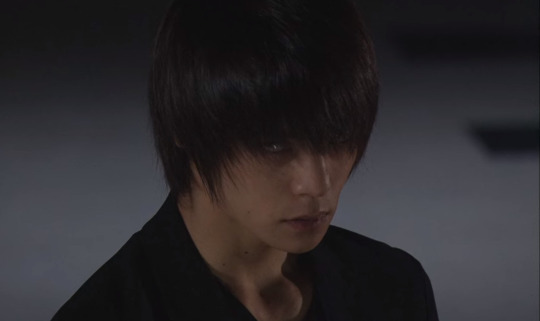
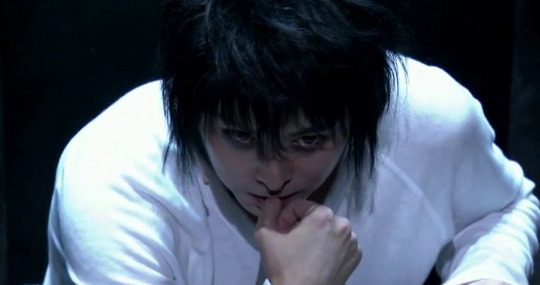
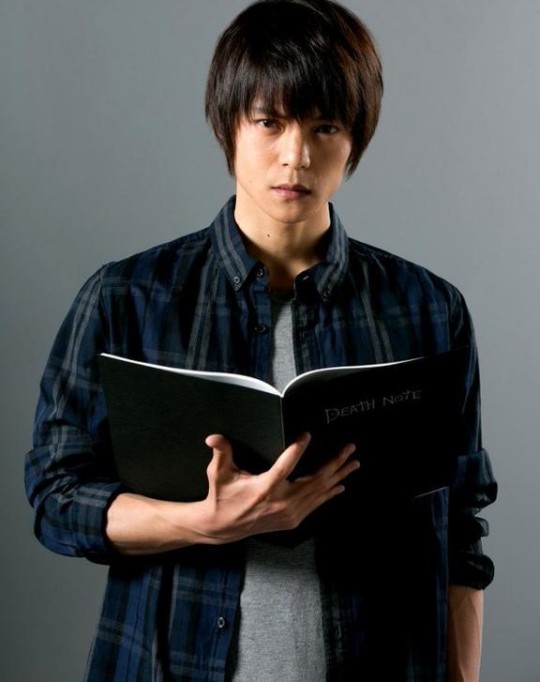
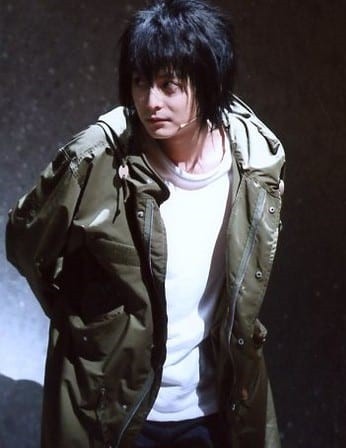
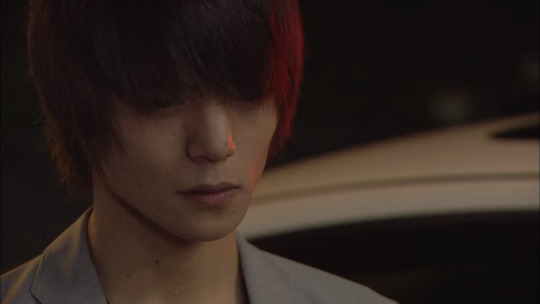
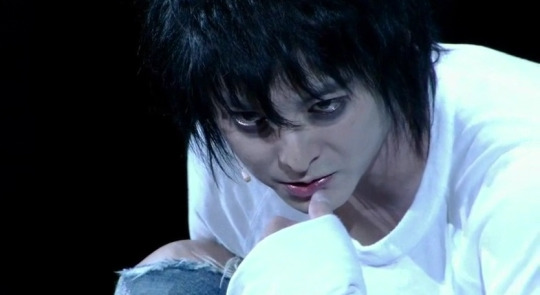
Please hear me out..... Jdrama!Light and Musical!L.
#I just think they're so neat they're my fave L and Light#everyone please tell me your favorite L and Light and explain why I'm so curious I wanna know#death note#death note drama#death note jdrama#death note musical#light yagami#l lawliet#masataka kubota#teppei koike#masataka is my favorite light because he's such a standout among the other lights his portrayal was so real and terrifying at times#koike is my favorite L because he just.... feels so much like L.... I've long since loved his L but I'm watching the 2017 for the first tim#and Everything about him is just. perfect. that's literally L like what the fuck#it's a fun activity just imagining different L and Light combinations because honestly a lot of them have different dynamics#so when you mix and match them it's almost guaranteed they would react to each other differently#jdrama lawlight and musical lawlight are pretty different and jmovie lawlight is too#I think animanga lawlight would have the biggest beef with their jdrama counterparts and it's extremely funny to imagine#fun science experiment#now everyone tell me your favorite combinations please
131 notes
·
View notes
Text
now that i have so many followers its funny when someone who has my main blog blocked because i made an untagged post about how i didnt like leafpool two years ago that was screencapped and passed around interacts with my posts LMAO
#im genuinely not upset about it (anymore. i was absolutely humiliated in the moment cause the post making fun of me got like 1k notes)#but its HILARIOUS in hindsight its one of my fave tumblr moments now#but yeah hiiiiii <3 that was me. sorry i didnt phrase my opinion well#in my defense it was on my main so i didnt think any wc fans would see it and get upset#no secret i dont care for the fandom's portrayal of leafpool. but ive warmed up to how she actually shows up in the series a bit#i WILL say i do end up associating her w/ my own mother bc i started rereading wc around a difficult period so its hard to get past that#personally. shrug. i understand this colors my interpretation of her but thats the beauty of literature my friends
16 notes
·
View notes
Text
I'm only halfway through it, will finish it...later. but my biggest gripe so far with Troy (2004) is how much they are butchering Menelaus. And not just by mispronouncing his name. He's portrayed as a cruel brute and I'm like bro. He does not deserve this treatment 😔
I understand some changes due to cultural shift and the nature of a different medium but. Why'd you gotta do Menelaus like that?
#wren rambles#greek mythology#troy (2004)#menelaus#the only character who is spot on PERFECT is Paris i think#because everytime hes on screen i want to punch his stupid face#even then though theyre trying to give him a *character arc* and make him Brave#BOOOO hes a pathetic man child#dang all my iliad related posts end up hating on paris huh#deserved.#anyway two things i think adoptions fail in#1) the portrayal or lack of portrayal of the gods#if you remove them fully it changes the whole vibe of the story#if you make them just Super Powered People and give them too much of a character arc beyond Force Of Nature it starts falling apart#and 2) overcompensating for modern values and morals#see: menelaus is a man who lives in a mysoginistic society so he must be Evil#(side note making helen and paris romance something the audience is supposed to root for is ALSO a bad take)#and also all the Girl Boss adaptations#i havent figured out what the balance is yet. but itll be there somewhere im sure
22 notes
·
View notes
Text
people who think Blue isn’t a realistic teenage girl don’t know what they’re talking about because her internal monologuing about how much she likes the idea of being a badass superhero with a pink switchblade but the practical part of her feels she’ll definitely cut herself with it is just So real
#(also if she wasn’t realistic it might not necessarily be a quality defect by I digress)#s speaks#s rereads the dream thieves#trc reread notes#trc#blue sargent#there’s this article I read about Skins ages ago that said something about Effy being not a realistic ‘person’ but a realistic/relatable#portrayal of how teenage girls feel or their self perception. So I think there’s something to be said there about Blue and other chars who#get discussed along those lines
21 notes
·
View notes